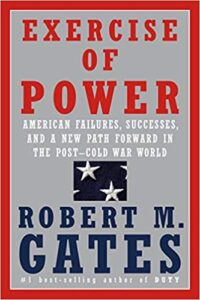 Are policies of engagement and enlargement that sought to encourage the spread of democracy and free markets appropriate in a new strategic context of great power competition?
Are policies of engagement and enlargement that sought to encourage the spread of democracy and free markets appropriate in a new strategic context of great power competition?
The COVID-19 pandemic will have a profound impact on foreign policy and national security, observers suggest. The long-term effects of the pandemic on the way we view our relations to government and each other are still to be determined, but one thing is clear: It changes perception of what matters in national security, Mieke Eoyang writes for Democracy.
For former Defence Secretary Robert Gates, the United States is “the most steadfast example and proponent of human rights and individual liberty, and defender of the repressed everywhere.” But in his latest book, “Exercise of Power,” he laments that “recent political leaders” have wielded power ineptly, leaned too heavily on the military and neglected such other “instruments of power” as persuasion, trade, aid, sanctions, public relations, and covert action, The New Yorker’s writes:
What Gates seeks, in essence, is reform: fewer choke holds, more community policing. A more supple exertion of influence, he argues, will shore up the United States’ flagging supremacy and “ensure that authoritarianism, twice defeated in the twentieth century, does not prevail in the twenty-first.”
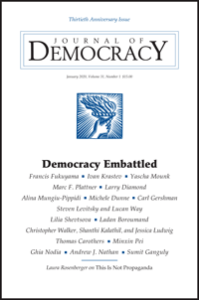 Clinton administration national security adviser Anthony Lake’s policy of “engagement and enlargement” entailed a policy to encourage the spread of “democracy and market economics” to places where these had not yet taken firm root, most notably across the vast expanse of Eurasia, an area that included China, Russia, the newly independent nations of the former Soviet Union, and the former members of its erstwhile empire, notes analyst Thomas F. Lynch III.
Clinton administration national security adviser Anthony Lake’s policy of “engagement and enlargement” entailed a policy to encourage the spread of “democracy and market economics” to places where these had not yet taken firm root, most notably across the vast expanse of Eurasia, an area that included China, Russia, the newly independent nations of the former Soviet Union, and the former members of its erstwhile empire, notes analyst Thomas F. Lynch III.
Over the course of the 1990s, the United States and its European allies were able to induce the smaller and weaker nations of the former Soviet empire to reshape their economic and political systems along liberal lines by making reform a requirement for full membership in the Western system, he writes in Strategic Assessment 2020: Into a New Era of Great Power Competition:
Lacking equivalent leverage with Russia and China, the democracies chose to take the opposite tack: incorporating these major powers as fully as possible into existing institutions (and, in particular, into the international economy) in the hopes that doing so would, in itself, promote liberalizing reforms. It is the failure of this approach, evidence of which has been accumulating for at least the past decade, that set the stage for the new era of Great Power competition.
“Thanks to the lingering aftereffects of the 2008 financial crisis and now the COVID-19 pandemic, the democracies are weaker and more divided at present than they were throughout most of the Cold War,” Lynch adds. “For these reasons, at least in its opening stages, the new era of Great Power competition could prove to be even more challenging than the one that preceded it.”
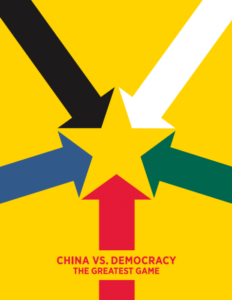 The U.S. cannot compete effectively with China if it abandons the liberal order that China’s behavior threatens, says a prominent analyst.
The U.S. cannot compete effectively with China if it abandons the liberal order that China’s behavior threatens, says a prominent analyst.
The liberal order is now caricatured by critics as a manifestation of a strategic idealism. Yet it was rooted in the sad realism that emerged from Great Depression and World War II—the realization that the world would surely descend into anarchy or worse absent enlightened leadership by its most powerful nation, argues Hal Brands:
But if the United States rejects the liberal order, then its competition with China is really just an effort to defend its own primacy. It isn’t clear why countries around the world—except those most tangibly menaced by Chinese military might—would join America in that effort. If America becomes less committed to the international order it created, expect many of its friends, particularly other democracies, to become less committed to supporting American leadership.
Discourse about the EU’s place in the world has changed over the past decade, says Stefan Lehne, a visiting scholar at Carnegie Europe.
“European politicians used to speak about foreign policy in terms of building a global liberal order, strengthening the transatlantic partnership, and safeguarding effective multilateralism,” he notes. ” Now politicians tend to focus on developing European sovereignty, ensuring strategic autonomy, and protecting the European way of life.”
Dr. Mira Rapp-Hooper, the Stephen A. Schwarzman Senior Fellow of Asia Studies at the Council on Foreign Relations, wades into the debate with Shields of the Republic, a defense of U.S. alliance logics that not only reminds readers what U.S. alliances have accomplished, but largely dispels the myths of their burdensome costs and entangling politics, the National Defense University’s Brett Swaney writes for Strategy Bridge:
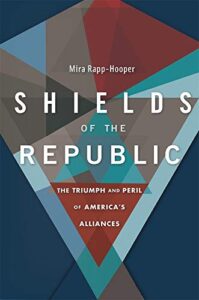 The generation living in the aftermath of World War II understood the value of these structures intrinsically. The most effective and efficient way to protect the American homeland and the economy was through global engagement and forward defense. Today, the barriers between nations and empowered subnational actors continue to shrink in the midst of a peacetime international system that is increasingly dominated by competition and coercion between great powers.
The generation living in the aftermath of World War II understood the value of these structures intrinsically. The most effective and efficient way to protect the American homeland and the economy was through global engagement and forward defense. Today, the barriers between nations and empowered subnational actors continue to shrink in the midst of a peacetime international system that is increasingly dominated by competition and coercion between great powers.
The emerging consensus in Washington is that China is a “strategic competitor” seeking to overturn that the liberal order, or at least assert its primacy within it, a sharp contrast to the previous assumption of what former deputy national security adviser Ben Rhodes famously derided as “The Blob,” that China was a rising power on track to become a responsible stakeholder in the liberal world order, Andrew Latham writes for The National Interest.
Patrick Porter’s bracing book, “The False Promise of Liberal Order,” contends that liberal – especially neo-liberal – projects led inadvertently to illiberal results and the very idea of a “liberal order” is contradictory, adds:
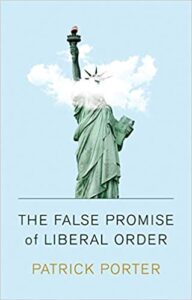 Liberalism, in the context of international relations, means freedom, equality, and consent, whereas world orders are hierarchies that rest “on the threat of force.” The United States, Porter writes, is the “gentlest hegemon thus far.” But it’s still a hegemon, and hegemony entails domination.
Liberalism, in the context of international relations, means freedom, equality, and consent, whereas world orders are hierarchies that rest “on the threat of force.” The United States, Porter writes, is the “gentlest hegemon thus far.” But it’s still a hegemon, and hegemony entails domination.
The international order is like a spider’s web, Porter claims: strong enough to catch the weak, too weak to catch the strong. It was established to maintain the existing hierarchy of nations, not to equalize all states.
Yet it is the international liberal order which has brought about the vast proliferation of democracy around the world, says Princeton University’s John Ikenberry. “Liberal democracy was both a national and an international project… Its institutions and ideals were premised on an expanding world of trade, exchange, and community,” he tells the Democracy Paradox blog. As Journal of Democracy contributor Sheri Berman, explains, “Liberalism unchecked by democracy can easily deteriorate into oligarchy or technocracy.” The two are linked.
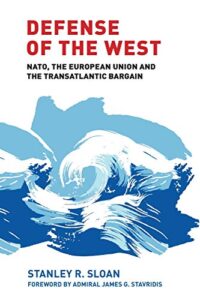 For those looking to understand the larger economic and technological trends and their implications, Deglobalization and International Security by T.X. Hammes offers detailed analysis and greater context, NDU’s Swaney adds. Readers would also do well to consider Stanley Sloan’s Defense of the West, and Victor Cha’s Powerplay, for a useful examination of the foundational principles and the political glue that holds our NATO and Pacific alliances together, sometimes in spite of severe crises.
For those looking to understand the larger economic and technological trends and their implications, Deglobalization and International Security by T.X. Hammes offers detailed analysis and greater context, NDU’s Swaney adds. Readers would also do well to consider Stanley Sloan’s Defense of the West, and Victor Cha’s Powerplay, for a useful examination of the foundational principles and the political glue that holds our NATO and Pacific alliances together, sometimes in spite of severe crises.
The success of the liberal order is not preordained. It will have to be fought for, compromised for, and rejuvenated, a leading analyst contends.
Whether it can be done without U.S. leadership will depend on the strengths of the major challengers — Russia and China — but above all on whether the West’s middle powers are prepared to band together, Dr Kori Schake writes in America vs the West: Can the liberal world order be preserved? a Lowy Institute Paper.







